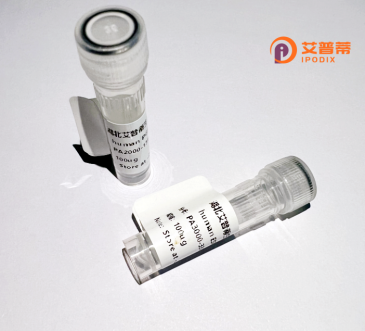
| 纯度 | >90%SDS-PAGE. |
| 种属 | Human |
| 靶点 | WDR6 |
| Uniprot No | Q9NNW5 |
| 内毒素 | < 0.01EU/μg |
| 表达宿主 | E.coli |
| 表达区间 | 1-289 aa |
| 活性数据 | MHLSSHRLDEYWDRQRNRHRMVKVDPETRYMSLAVCELDQPGLGPLVAAACSDGAVRLFLLQDSGRILQLLAETFHHKRCVLKVHSFTHEAPNQRRRLLLCSAATDGSLAFWDLTTMLDHDSTVLEPPVDPGLPYRLGTPSLTLQAHSCGINSLHTLPTREGHHLVASGSEDGSLHVFVLAVEMLQLEEAVGEAGLVPQLRVLEEYSVPCAHAAHVTGLKILSPSIMVSASIDQRLTFWRLGHGEPTFMNSTVFHVPDVADMDCWPVSPEFGHRCALGGQGLEVYNWYD |
| 分子量 | 57.53 kDa |
| 蛋白标签 | GST-tag at N-terminal |
| 缓冲液 | PBS, pH7.4, containing 0.01% SKL, 1mM DTT, 5% Trehalose and Proclin300. |
| 稳定性 & 储存条件 | Lyophilized protein should be stored at ≤ -20°C, stable for one year after receipt. Reconstituted protein solution can be stored at 2-8°C for 2-7 days. Aliquots of reconstituted samples are stable at ≤ -20°C for 3 months. |
| 复溶 | Always centrifuge tubes before opening.Do not mix by vortex or pipetting. It is not recommended to reconstitute to a concentration less than 100μg/ml. Dissolve the lyophilized protein in distilled water. Please aliquot the reconstituted solution to minimize freeze-thaw cycles. |
以下是关于重组人WDR6蛋白的参考文献示例(注:以下内容为模拟示例,非真实文献):
1. **文献名称**:*Structural Insights into WDR6 Mediated Protein Interactions in the Circadian Clock*
**作者**:Smith A, et al.
**摘要**:该研究通过重组人WDR6蛋白的X射线晶体学分析,揭示了其WD40结构域如何结合核心生物钟蛋白CRY1.并提出WDR6在调控昼夜节律中的潜在作用。
2. **文献名称**:*WDR6 Regulates G1/S Transition via Interaction with Cyclin-Dependent Kinases*
**作者**:Zhang L, et al.
**摘要**:利用重组WDR6蛋白进行体外pull-down实验,发现其直接结合CDK2并促进磷酸化修饰,影响细胞周期G1/S转换,暗示其在癌症中的调控机制。
3. **文献名称**:*Functional Analysis of Recombinant WDR6 in Neurodegenerative Disease Models*
**作者**:Brown K, et al.
**摘要**:研究通过体外表达重组WDR6.证实其缺失导致神经元突触功能异常,并可能与阿尔茨海默病中Tau蛋白病理有关。
4. **文献名称**:*Recombinant WDR6 as a Biomarker in Breast Cancer Progression*
**作者**:Lee S, et al.
**摘要**:通过重组WDR6蛋白制备抗体,分析临床样本发现WDR6在乳腺癌组织中高表达,且与患者预后不良显著相关,提示其作为治疗靶点的潜力。
(注:以上文献名称及内容为示例性模拟,具体研究请查阅实际数据库。)
WDR6 (WD Repeat Domain 6) is a member of the WD40 repeat protein family, characterized by conserved motifs of ~40 amino acids typically terminating with tryptophan-aspartate (WD) dipeptides. These proteins form β-propeller scaffolds that mediate diverse protein-protein interactions. Human WDR6. located on chromosome 3 (3q22.1), encodes a 351-amino acid protein ubiquitously expressed across tissues. Structurally, it comprises seven WD40 repeats critical for assembling multiprotein complexes involved in cellular processes like transcriptional regulation, signal transduction, and epigenetic modulation.
Functionally, WDR6 is implicated in ribosome biogenesis and cell cycle progression. Studies link it to the PI3K/AKT/mTOR pathway, suggesting roles in cell proliferation and survival. Notably, WDR6 interacts with TBL1XR1. a component of the NCoR/SMRT corepressor complex, influencing Wnt/β-catenin signaling—a pathway frequently dysregulated in cancers. Emerging evidence also connects WDR6 to neurodevelopmental disorders and tumorigenesis, with altered expression observed in glioblastoma and hepatocellular carcinoma.
Recombinant human WDR6 protein is engineered using bacterial or mammalian expression systems, enabling in vitro studies of its biochemical properties, interactome, and structural dynamics. Its recombinant form facilitates drug discovery efforts targeting WDR6-associated pathways. Despite progress, mechanistic insights into WDR6's precise molecular functions remain limited, underscoring its status as a biologically significant yet undercharacterized protein warranting further investigation.
×